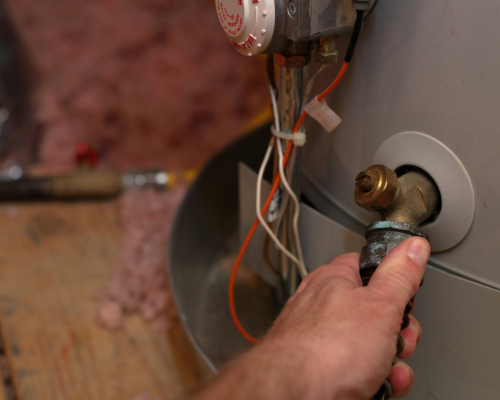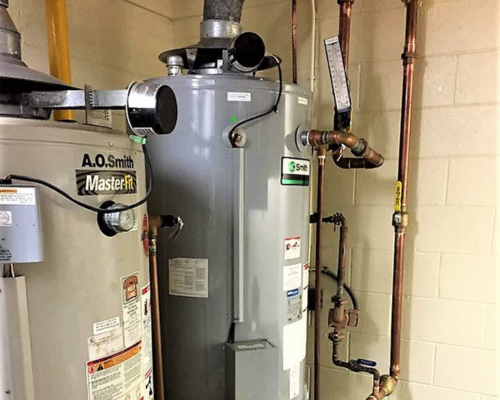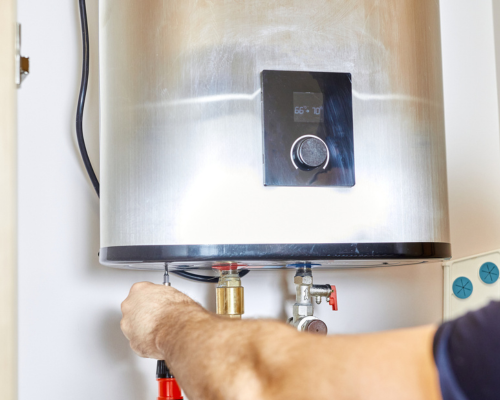Here are some reasons why water heater repair is important:

1. Restores hot water supply: A broken water heater can leave you without hot water, making it difficult to shower, wash dishes, or do laundry. Repairing your water heater can restore your hot water supply and make your daily activities more comfortable and convenient.
2. Saves money: Repairing your water heater can be more cost-effective than replacing it. A professional plumber can diagnose the problem and offer a solution that will save you money in the long run.
3. Prevents water damage: A leaking water heater can cause water damage to your property, leading to costly repairs. Repairing your water heater can prevent leaks and protect your property from water damage.
4. Increases energy efficiency: A well-maintained water heater can operate more efficiently, reducing your energy bills and carbon footprint. Repairing your water heater can improve its efficiency and save you money on your energy bills.
5. Extends the life of your water heater: Regular maintenance and repair can extend the life of your water heater, saving you money on replacement costs. Master plumber Tillman Graham can offer preventative maintenance services that will keep your water heater running smoothly for years to come.
In conclusion, water heater repair is an important aspect of plumbing services. It can restore your hot water supply, save you money, prevent water damage, increase energy efficiency, and extend the life of your water heater. If you need water heater repair services, it’s important to work with a professional plumber that can provide prompt and reliable services. If you would like to book your water heater repair today Graham's Plumbing can help!
Water Heater Install

Water heater installation is a crucial aspect of plumbing services, as it is responsible for providing hot water in homes and commercial buildings. A water heater is a device that heats water and stores it in a tank, which is then distributed to various fixtures in the building. Installing a water heater requires expertise and knowledge of plumbing systems, as well as the ability to work with electrical and gas connections.
The first step in water heater installation is determining the appropriate size for the building. A plumber will assess the building’s hot water needs, including the number of occupants, the number of fixtures, and the water usage patterns. Based on this information, the plumber will recommend a water heater size that will meet the building’s hot water requirements.
Once the appropriate size is determined, the plumber will select the type of water heater to install. There are several types of water heaters, including tankless, conventional, and hybrid models. Each type has its unique features and benefits, and the plumber will recommend the best option for the building based on its hot water needs, energy efficiency, and budget.
After selecting the water heater, the plumber will prepare the installation area. This may involve removing the old water heater, if necessary, and preparing the space for the new unit. The plumber will then install the water heater according to the manufacturer’s specifications, ensuring that it is correctly connected to the electrical or gas supply and that all necessary safety features are in place.
The final step in water heater installation is testing and commissioning. The plumber will fill the tank with water, check for leaks and ensure that the water is heated to the desired temperature. The plumber will also provide the building owner or manager with instructions on how to operate and maintain the water heater to ensure optimal performance and longevity.
In summary, water heater installation requires expertise, knowledge of plumbing systems, and the ability to work with electrical and gas connections. A professional plumber can help determine the appropriate size and type of water heater for a building, prepare the installation area, and install the unit according to the manufacturer’s specifications. Testing and commissioning ensure that the water heater is functioning correctly and providing hot water to the building’s occupants. If you would like to know your options or book your water heater installation today Graham's Plumbing can help!
Tankless Water Heater Install

Tankless water heaters are becoming increasingly popular in homes and commercial buildings due to their energy efficiency and convenience. Unlike traditional water heaters that store hot water in a tank, tankless models heat water on-demand, providing hot water only when needed. Installing a tankless water heater requires expertise and knowledge of plumbing systems, as well as the ability to work with electrical and gas connections.
The first step in tankless water heater installation is determining the appropriate size for the building. A plumber will assess the building’s hot water needs, including the number of occupants, the number of fixtures, and the water usage patterns. Based on this information, the plumber will recommend a tankless water heater size that will meet the building’s hot water requirements.
Once the appropriate size is determined, the plumber will select the type of tankless water heater to install. There are several types of tankless water heaters, including electric, gas, and propane models. Each type has its unique features and benefits, and the plumber will recommend the best option for the building based on its hot water needs, energy efficiency, and budget.
After selecting the tankless water heater, the plumber will prepare the installation area. This may involve removing the old water heater, if necessary, and preparing the space for the new unit. The plumber will then install the tankless water heater according to the manufacturer’s specifications, ensuring that it is correctly connected to the electrical or gas supply and that all necessary safety features are in place.
The final step in tankless water heater installation is testing and commissioning. The plumber will turn on the unit and check for leaks, ensuring that the water is heated to the desired temperature. The plumber will also provide the building owner or manager with instructions on how to operate and maintain the tankless water heater to ensure optimal performance and longevity.
Tankless water heater installation requires expertise, knowledge of plumbing systems, and the ability to work with electrical and gas connections. A professional plumber can help determine the appropriate size and type of tankless water heater for a building, prepare the installation area, and install the unit according to the manufacturer’s specifications. Testing and commissioning ensure that the tankless water heater is functioning correctly and providing hot water on-demand to the building’s occupants. If you would like to know your options or book your tankless water heater install Graham's Plumbing can help!


